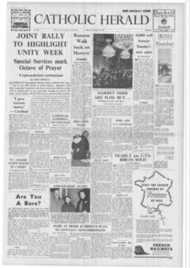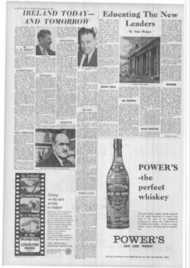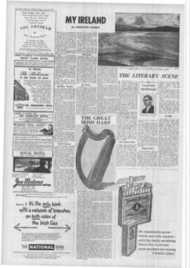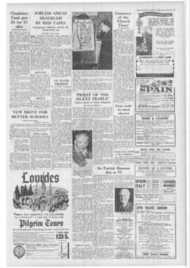Page 10, 18th January 1963
Page 10

Report an error
Noticed an error on this page?If you've noticed an error in this article please click here to report it.
Tags
Share
Related articles
)desmond Fennell's Dublin Diary
Galway Needs A Slogan
The Professional Touch
How Bereavement Affects Northern Lrelanders
Belfast Internees Allege 'electric Shock Torture'
MY IRELAND
By DESMOND FISHER
THE crowd of blue-ganseyed, rubber-booted fishermen in the tap room of the pub looked shocked. I had asked them in hastily-remembered Gaelic—for this was an Irish-speaking district—if anyone knew where I could buy a salmon for tomorrow's lunch. With four children and three adults to feed, appetites sharpened by the Atlantic breezes, a 10-pound fish was what I was after.
The publican took me gently aside. It was, he explained, out of season. No " legitimate " salmon were to be had.
. . . ." I said, letting the insinuation drop quietly into the smoke-laden air. Ile ran his finger down the side of his nose, shut one shrewd eye in a gesture that could have been an accomplice's wink or a sign of resignation and poured me another Guinness.
It was well after midnight when I heard the sound of a car outside the house, a thud at the door and the noise of the car receding. I opened the front door of the cottage we had rented for the month and saw a silver gleam in the moonlight. A beautiful salmon-trout, eyes still bright, scales a lovely silver-blue, lay on the step wrapped carelessly in a piece of dean sacking.
Next day, without a word of acknowledgement, the publican accepted a pound note for his "friend" and we dined luxuriously on his catch.
Surface Veneer
That is the sort of thing one is always coming across in what, using Corkery's phrase, I call the "Hidden Ireland". It is an aspect of her many-sided self which Ireland does not show to everyone. Too often she presents to her visitor only the surface veneer of a charm which is really a dissimulation, bred over the centuries of suffering and discrimination.
The real Ireland lies deep in the hearts of a kindly and generous people. You will find it when you !east expect it, and if you look for it it will escape you, just as a leprechaun never fails to elude the human who would catch him and make him reveal his hoard of gold.
Often I have been called on to advise people going to Ireland on business or holiday, and when they have asked me for a list of "contacts" I have invariably refused. My rule was to give them the name of one contact and assure them that no more was required. That one would pass him on to another, the second to a third and so on. If he wanted to meet a particular person he had only to mention it for arrangements to be made. Ireland is a small country and her family trees intertwine so it is usually a question of "knowing a man who knows a man".
Never once was I proved wrong, and regularly my English acquaintances would report back to me that, in the words of one of them, they had "never hit the ground" from the time they arriveduntil the day they left, usually driven to the airport or ship by a covey of their new-made Irish friends.
Golf Courses
I can still remember the awed expression on the face of an Englishman invited at 12.30 p.m. to come out for a round of golf, have lunch at the club and be back for a conference at 3 p.m. He did not realise that there are a dozen golf courses within ten minutes' drive from the centre of Dublin.
That is another beauty of Ireland —the fact that the country is never far away. In 15 minutes by car from Nelson Pillar (the tolerant Dubliners have let the monument stay despite some nationalistic mutterings) you can be fishing, hunting. shooting, swimming or pursuing any one of a dozen other entertainments.
And one really does get out of the city. Six miles from the Pillar and you can be up the Dublin mountains beyond Tibradden, so near in distance and yet so different in atmosphere. You look down at the vast central plain with Dublin nestling at its edge and it looks very much as it must have looked to the saffron-clad Irish kern, with his sword in his hand, as he gazed down to the city of the Pale where the English settlers were putting a new invocation in the Litany: "From the fury of the Flahertys, good Lord deliver us".
Up here in the mountains is the hest vantage-point to see the city at night. Dublin stretches round , like a vast lake of light. from the flashing beacon at the northern end which marks Dublin Airport, past the western perimeter with its packed satellite suburbs, to Dunlaoire Harbour and Bray.
On the eastern side is the dark sea, fringed with a gleaming necklace of lights from jewelled Howth Head, round by Sutton and Dollymount and the city itself, to the point where Bray Head cuts off the view.
It is a superb sight. almost as beautiful as is the view from the Acropolis of Athens, with the Tights of the city sparkling in the clear Attic air right out to Piraeus.
Memories
Thumbing back through a kaleidoscope of memories, I pull a few out of the past—the night that a Donegal storekeeper shut up shop at 10 p.m.—a busy time in those parts—to find me a bed for the night; the hotel-keeper in Belmullet who refused my order for bacon-and-eggs and firmly put down the nicest mackerel I have ever tasted in my life; the way that Jimmy Coll, teacher-cum-publicancum-shopkeeper in Derrybeg near the north-west tip of Donegal, chased round the countryside looking for a mother's help to come back to London with us; the shy girl who brought golden griddle cakes, creamy yellow butter and eggs still hot from the nest to our cottage at Dugort in Achill Island and never waited even for a "Thank you".
No Ferry
I remember, too, the year we went on a cycling tour in Connemara and came after miles of lonely bog road to a place where the map marked a ferry across an inlet. The map was wrong but our choice of a house to ask for guidance was not. We were taken in, given a high tea of boiled eggs, fresh-baked soda bread and mugs of good, strong tea to while away the time until the boat "shwam" on the rising tide and we could be rowed across. And the 15-year-old lad who ferried us had to be forced to take a packet of cigarettes as a token of gratitude for the family's hospitality.
Other things come to mind like the strong countrywoman I met sitting on a small quay wall waiting for the currach to take her out to a wake on the island. A girl had died young in Scotland and the body was being brought home for burial. It was a terrible blow for the family, she said, and she was going across to sympathise. Only half-an-hour and a great many questions later did it emerge that she herself was recently widowed: her husband had caught his foot in his bicycle, fallen off and was killed immediately when his head hit a stone. "Sure it was God's will and who are we to question it" she asked in a matterof-fact way, not pitying herself hut simply stating a truth in which she believed.
I think, too, of the fine young islander met on a lonely Kerry strand. He and his family were the last of 36 families left on the island. Soon they would have to leave as it was too dangerous to live there alone. There was a far-off yearning in his eyes as he looked across the waves to his island home soon to be abandoned to the gulls and the cormorants.
But that is only "my" Ireland. And the beauty of Ireland is that she gives herself, not to anyone, but to the person who comes to her openly and sincerely and not looking for "quaintness" or oddness. There is an outward and superficial charm for the unfeeling or the merely inquisitive. The "hidden Ireland" is a shy lady who conceals her attractions under a modest exterior. Knowledge comes through sympathy and in its turn brings love.
blog comments powered by Disqus















